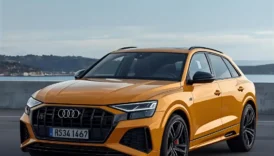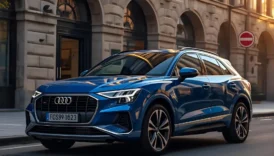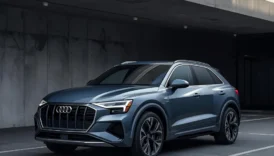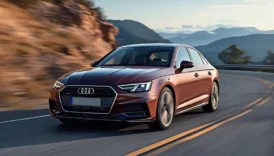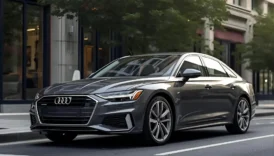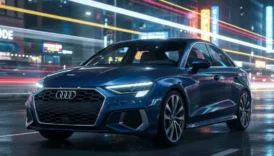2025 Audi Q7: Performance and Standout Features
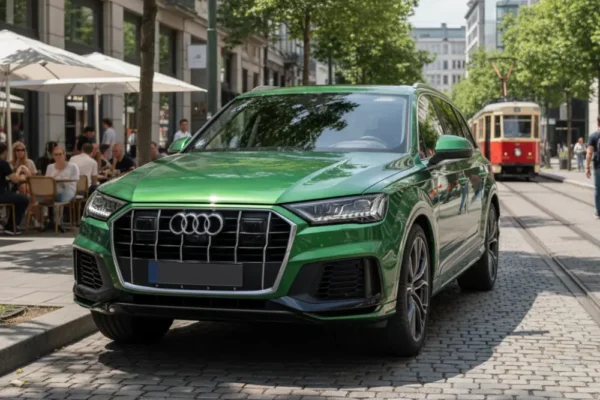
- 2025 Audi Q7: Performance and Standout Features
- What’s New in the 2025 Audi Q7?
- Refreshed Exterior Styling
- Upgraded Powertrains
- Enhanced In-Cabin Technology
- Safety and Assistance Enhancements
- Trim and Equipment Adjustments
- Engine Options and Performance
- Updated Powertrain Lineup
- Mild-Hybrid Technology
- Transmission and Drivetrain
- Towing and Capability
- Real-World Performance
- Driving Experience and Handling
- Ride Comfort and Suspension Options
- Steering and Handling Dynamics
- quattro All-Wheel Drive Confidence
- Drive Select Modes
- Real-World Driving Impressions
- Interior Design and Comfort Features
- Refined Cabin Design
- Seating Comfort and Configuration
- Climate and Acoustic Comfort
- Practical Luxury Touches
- Real-World Comfort Experience
- Advanced Safety and Driver Assistance Systems
- Standard Safety Equipment
- Advanced Driver Assistance Package
- Structural Safety and Crash Engineering
- Real-World Safety Experience
- Technology and Infotainment Upgrades
- Updated MMI Touch Response System
- Audi Virtual Cockpit Plus
- Enhanced Connectivity
- Premium Audio Systems
- Smart Features and Digital Convenience
- Real-World Usability
- Fuel Efficiency and Real-World Economy
- Official Fuel Economy Estimates
- Role of the 48-Volt Mild-Hybrid System
- Real-World Fuel Efficiency
- Practical Ownership Perspective
- Dimensions, Cargo Space, and Practicality
- Exterior Dimensions
- Passenger Space and Cabin Layout
- Cargo Capacity and Versatility
- Everyday Practicality
- Real-World Usability
- Common Issues and Long-Term Reliability
- Overall Reliability Outlook
- Commonly Reported Issues in Previous Generations
- Preventive Maintenance and Best Practices
- Long-Term Durability
- Maintenance Schedule and Ownership Experience
- Recommended Maintenance Intervals
- Maintenance Programs and Cost Management
- Ownership Experience
- Long-Term Value
- Frequently Asked Questions (FAQ)
- What engines are available in the 2025 Audi Q7?
- Is the 2025 Audi Q7 fuel-efficient for its size?
- Does the 2025 Q7 have a comfortable third row?
- What’s new in the 2025 Q7 compared to the previous model?
- How much can the Q7 tow?
- Are there any common problems with the Audi Q7?
- How often does the Q7 need maintenance?
- Is the 2025 Q7 good for long-term ownership?
- How does the Q7 compare to competitors like the BMW X5 or Mercedes GLE?
The 2025 Audi Q7 arrives with a refreshed design, upgraded technology, and improved powertrains, reaffirming its place as one of the most versatile luxury SUVs in its class. Known for its blend of sophisticated styling, refined performance, and everyday practicality, the new Q7 refines its formula with enhanced infotainment, advanced driver assistance systems, and subtle exterior updates. Whether tackling long road trips or daily family duties, the 2025 Q7 delivers a premium driving experience with a strong emphasis on comfort, capability, and innovation.
What’s New in the 2025 Audi Q7?
The 2025 Audi Q7 receives a comprehensive mid-cycle refresh, bringing updated styling, improved in-car technology, and refined powertrains that enhance both performance and efficiency. While it retains the core qualities that have made it a popular choice in the luxury SUV segment, this model year focuses on modernizing the driving experience and sharpening the vehicle’s visual identity.
Refreshed Exterior Styling
Audi’s signature design language evolves subtly but effectively for 2025:
- A redesigned Singleframe grille with a more angular pattern gives the Q7 a bolder, more sophisticated look.
- New LED and optional HD Matrix LED headlights with digital daytime running light signatures add a high-tech presence, especially at night.
- Revised front and rear bumpers emphasize width and athleticism, while new wheel designs (ranging up to 22 inches) offer more personalization.
- Updated taillights with digital OLED technology (on higher trims) provide customizable lighting signatures and improved visibility.
Upgraded Powertrains
Audi has refined its engine lineup for 2025, focusing on efficiency and responsiveness. Both the four-cylinder and six-cylinder options receive software and hardware updates to improve low-end torque and reduce emissions. Mild-hybrid systems are now standard across all variants, contributing to smoother power delivery and better fuel economy.
Enhanced In-Cabin Technology
Inside, the 2025 Q7 debuts Audi’s latest infotainment system with faster processing, new graphics, and improved voice control. The digital interface is more responsive, and over-the-air updates are supported for both software and navigation. Wireless Apple CarPlay and Android Auto remain standard, but the user experience is now more seamless and integrated.
Safety and Assistance Enhancements
Audi has expanded its driver assistance suite with improved adaptive cruise control and lane-centering capabilities, bringing the Q7 closer to semi-autonomous highway driving. Updated sensor arrays provide better detection accuracy for surrounding vehicles and pedestrians.
Trim and Equipment Adjustments
- New standard features include ambient lighting, power-folding mirrors, and more advanced parking assistance.
- Higher trims offer expanded luxury packages with upgraded interior materials, new color options, and additional convenience technologies.
In short, the 2025 Audi Q7 modernizes its design and technology while preserving the balanced luxury SUV formula that buyers expect. The updates make it sharper, smarter, and more refined, ensuring it remains competitive against rivals like the BMW X5, Mercedes GLE, and Volvo XC90.
Engine Options and Performance
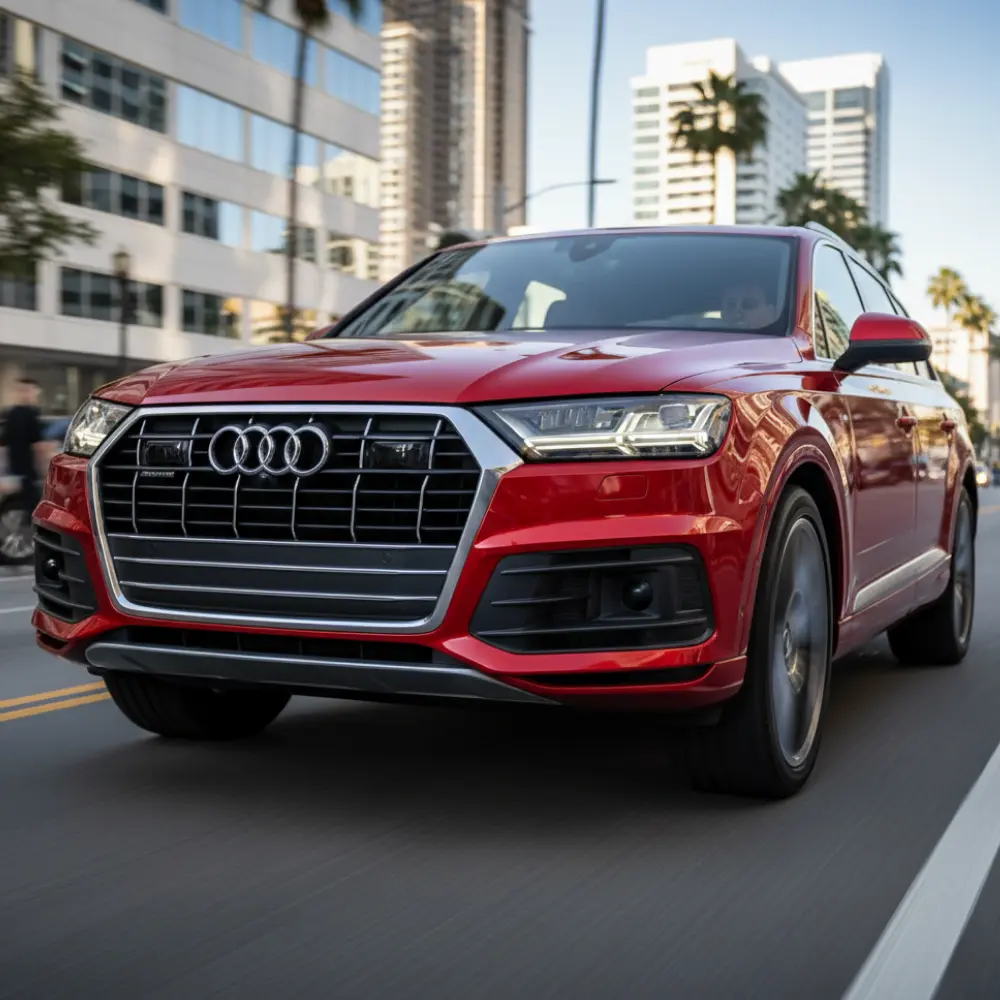
The 2025 Audi Q7 continues to offer a diverse and well-balanced powertrain lineup, blending efficiency with refined power delivery. With updated engines, standard mild-hybrid technology, and Audi’s signature quattro all-wheel drive, the new Q7 provides smooth acceleration, confident handling, and versatility for both city commutes and long-distance journeys.
Updated Powertrain Lineup
Audi refines both of its core engine options for 2025, improving responsiveness and fuel efficiency without compromising performance:
- 2.0-liter Turbocharged Inline-Four (45 TFSI)
- Output: 261 hp and 273 lb-ft of torque
- 0–60 mph: 6.7 seconds (approx.)
- Standard quattro all-wheel drive and 8-speed automatic transmission
- Ideal for everyday driving, combining solid power with impressive efficiency.
- 3.0-liter Turbocharged V6 with Mild-Hybrid (55 TFSI)
- Output: 335 hp and 369 lb-ft of torque
- 0–60 mph: 5.5 seconds (approx.)
- Features a 48-volt mild-hybrid system that assists during acceleration and allows engine-off coasting.
- Smooth, effortless power delivery makes this engine the sweet spot for most buyers.
For performance enthusiasts, the SQ7 variant continues with its 4.0-liter twin-turbocharged V8, delivering thrilling acceleration and sharper dynamics. Though technically separate, it shares the Q7’s core platform and elevates it into true performance SUV territory.
Mild-Hybrid Technology
All 2025 Q7 powertrains now include 48-volt mild-hybrid systems. These systems:
- Provide a brief torque assist during initial acceleration, reducing turbo lag.
- Enable extended engine-off coasting at highway speeds to save fuel.
- Power the start/stop system more smoothly, improving refinement in traffic.
- Contribute to slight improvements in both performance and efficiency compared to previous years.
Transmission and Drivetrain
Every Q7 features an 8-speed Tiptronic automatic transmission paired with quattro all-wheel drive. The transmission is well-calibrated for both brisk acceleration and relaxed cruising, shifting smoothly and intuitively. Quattro ensures excellent traction in wet or snowy conditions, as well as enhanced stability during cornering.
Towing and Capability
The V6-equipped Q7 offers up to 7,700 pounds of towing capacity when properly equipped, making it suitable for trailers, boats, or small campers. Even the four-cylinder variant provides respectable towing capability for lighter loads, thanks to the confidence of quattro.
Real-World Performance
On the road, the four-cylinder is more than adequate for daily use, offering a balanced blend of power and efficiency. The V6, however, stands out for its effortless acceleration and refinement, making highway merges and passing maneuvers smooth and confident. The mild-hybrid system’s seamless operation enhances the feeling of polish, making the 2025 Q7 a quiet and capable performer in any situation.
Driving Experience and Handling
The 2025 Audi Q7 continues to excel as one of the most well-rounded luxury SUVs on the road, offering a refined, composed ride with surprisingly agile handling for its size. Thanks to its balanced chassis, advanced suspension systems, and quattro all-wheel drive, the Q7 delivers a comfortable yet confident driving experience, whether navigating tight city streets or cruising on the open highway.
Ride Comfort and Suspension Options
Audi offers multiple suspension setups that allow the Q7 to adapt to different driving preferences:
- Standard Coil-Spring Suspension: Tuned for comfort and stability, it provides a smooth ride over most road surfaces, making it ideal for daily driving.
- Adaptive Air Suspension (Optional): Available on higher trims, this system allows the driver to adjust ride height and damping characteristics. It automatically lowers at higher speeds for improved aerodynamics and stability, and can be raised for additional ground clearance when tackling rougher terrain.
- Sport-Tuned Suspension (SQ7): Optimized for sharper response and reduced body roll, this setup brings a more dynamic feel without sacrificing daily usability.
Even with its three-row configuration, the Q7 maintains a remarkable level of ride refinement, isolating occupants from road imperfections while retaining a connected, natural steering feel.
Steering and Handling Dynamics
The electromechanical power steering system is light and precise at low speeds, making parking and urban driving effortless. As speed increases, the steering weights up progressively, providing a reassuring sense of control. On twisty roads, the Q7 feels stable and composed, with minimal body roll thanks to its well-tuned suspension and balanced weight distribution.
For those seeking even more agility, optional all-wheel steering is available. This system turns the rear wheels opposite to the front at low speeds for a tighter turning radius, and in the same direction at higher speeds for enhanced stability — making the Q7 feel nimbler than its size suggests.
quattro All-Wheel Drive Confidence
Standard on all models, Audi’s legendary quattro all-wheel drive system continuously distributes power between the front and rear axles for optimal traction and handling. This not only improves performance in poor weather conditions but also enhances cornering stability, allowing the Q7 to maintain its composure on wet, snowy, or winding roads.
Drive Select Modes
The Audi Drive Select system lets drivers tailor the Q7’s character to their mood or environment. Modes include:
- Comfort: Prioritizes a soft, plush ride with relaxed steering and throttle response.
- Auto: Adapts dynamically to driving style.
- Dynamic: Sharpens throttle, transmission, and steering response for a sportier feel.
- Off-Road (with air suspension): Raises the ride height and adjusts traction settings for light off-road conditions.
- Individual: Allows drivers to customize parameters like steering, suspension, and throttle independently.
Real-World Driving Impressions
On the highway, the 2025 Q7 feels calm, stable, and whisper-quiet, making it excellent for long journeys. Around town, its light steering and well-calibrated throttle make it easy to maneuver despite its size. In Dynamic mode, it surprises with its controlled body movements and precise handling, rivaling smaller SUVs in agility.
In short, the driving experience of the 2025 Audi Q7 is defined by balance — a blend of comfort, capability, and subtle sportiness that makes it one of the most versatile luxury SUVs in its class.
Interior Design and Comfort Features
The 2025 Audi Q7 delivers a cabin that exemplifies modern luxury, meticulous craftsmanship, and thoughtful practicality. As a three-row luxury SUV, it combines elegant design with everyday usability, offering a premium driving environment for both driver and passengers. The latest model enhances comfort, technology integration, and material quality, reaffirming the Q7’s status as one of the benchmarks in its segment.
Refined Cabin Design
The 2025 Q7 retains Audi’s signature horizontal, clean design language, focusing on minimalism and functionality:
- Layered Dash Layout: The dashboard integrates multiple digital screens seamlessly, creating a futuristic but uncluttered aesthetic.
- Premium Materials: Soft-touch surfaces, real wood or brushed aluminum inlays, and finely stitched leather elevate the interior ambiance.
- Ambient Lighting: Standard multi-color ambient lighting allows occupants to personalize the cabin’s mood, especially effective during night drives.
- Panoramic Sunroof: Standard on most trims, it floods the cabin with natural light, enhancing the sense of openness.
The build quality remains excellent, with every switch, vent, and seam exhibiting Audi’s hallmark precision.
Seating Comfort and Configuration
The Q7 is designed to seat up to seven passengers across three rows, providing exceptional comfort and flexibility:
- Front Seats: Heated, power-adjustable with four-way lumbar support as standard. Ventilation and massage functions are available on higher trims, making long drives effortless.
- Second Row: Sliding and reclining bench or optional captain’s chairs, offering generous legroom and supportive cushioning. Heated seats and individual climate zones are available.
- Third Row: Best suited for children or shorter trips, but still more usable than many competitors’ third rows. Easy access is provided by a power-assisted second-row folding mechanism.
All seats are trimmed in high-quality materials, with optional Valcona leather and contrast stitching for a more upscale appearance.
Climate and Acoustic Comfort
- Four-Zone Automatic Climate Control: Ensures personalized comfort for all occupants, even those in the rear rows.
- Acoustic Insulation: Extensive sound-deadening materials and laminated glass contribute to a whisper-quiet cabin, even at highway speeds.
- Air Quality Package (Optional): Includes an air ionizer and fragrance system, enhancing the sense of luxury and wellness.
Practical Luxury Touches
Audi adds thoughtful details throughout the cabin to make daily life easier:
- Ample Storage Spaces: Cleverly designed compartments for small items, cupholders, and wireless charging pads keep the cabin organized.
- Power Tailgate with Hands-Free Access: Standard, improving convenience when loading groceries or luggage.
- Multiple USB-C ports and available 12V outlets ensure everyone can stay connected on the go.
Real-World Comfort Experience
In everyday use, the 2025 Q7 stands out for its combination of luxury and practicality. The front and second-row seats provide exceptional support for long journeys, while the overall cabin ambiance remains serene and inviting. Whether it’s a family road trip or a business commute, the Q7’s interior is equally at home.
In short, the 2025 Audi Q7 interior blends elegant design with advanced comfort features, offering a space that feels both luxurious and genuinely livable.
Advanced Safety and Driver Assistance Systems
The 2025 Audi Q7 raises the bar for safety and driver assistance by combining robust structural engineering with advanced sensor-based technologies. Audi refines its existing safety suite for this model year, offering improved semi-autonomous highway capabilities, sharper detection accuracy, and smoother system interventions that enhance both safety and driving comfort.
Standard Safety Equipment
Even base trims of the 2025 Q7 come well-equipped with a wide range of active and passive safety systems:
- Audi pre sense front and rear – Detects potential collisions, prepares the cabin, and can apply automatic emergency braking.
- Lane departure warning – Alerts the driver if the vehicle drifts unintentionally.
- Front and rear parking sensors – Aid maneuvering in tight spaces.
- Rearview camera with clear display.
- Multiple airbags including side curtain airbags for all three rows.
- Tire pressure monitoring system and automatic post-collision braking to reduce secondary impact risks.
These features ensure a high baseline of safety across all trims, even without optional packages.
Advanced Driver Assistance Package
For buyers seeking maximum assistance capability, Audi offers an optional Driver Assistance Package that brings the Q7 closer to semi-autonomous driving:
- Adaptive Cruise Assist with Lane Guidance: Combines adaptive cruise control and lane centering to provide smooth, semi-automated highway driving.
- Traffic Jam Assist: Operates at lower speeds, handling acceleration, braking, and steering in congested traffic while the driver remains engaged.
- Active Lane Keeping and Emergency Assist: Keeps the Q7 centered in its lane and can safely bring the vehicle to a stop if the driver becomes unresponsive.
- Audi Side Assist (Blind Spot Monitoring): Monitors adjacent lanes and alerts drivers to vehicles in blind spots or approaching quickly from behind.
- Intersection Assist: Detects cross traffic at junctions and can issue warnings or apply brakes to prevent collisions.
- 360° Camera System: Provides a bird’s-eye view to make parking and tight maneuvers effortless.
Structural Safety and Crash Engineering
The Q7’s MLB Evo platform uses a combination of high-strength steel and aluminum to maximize structural integrity while minimizing weight. Key elements include:
- A rigid passenger cell designed to maintain space for occupants in severe impacts.
- Optimized crumple zones that absorb and redirect crash energy away from the cabin.
- Low center of gravity for better stability in evasive maneuvers.
- Integrated Pre sense systems that pre-tighten seat belts, close windows, and adjust seat positions when a collision is imminent.
Real-World Safety Experience
Audi’s safety and assistance systems are known for their refinement and reliability. In real-world use, adaptive cruise and lane guidance functions operate smoothly, avoiding the abrupt interventions sometimes found in rival systems. The 360° camera and parking aids are particularly helpful for navigating urban environments or tight parking lots, especially given the Q7’s size.
In summary, the 2025 Audi Q7 combines intelligent assistance technology with solid structural engineering, offering a high level of safety confidence whether on highways, in traffic, or during everyday driving.
Technology and Infotainment Upgrades
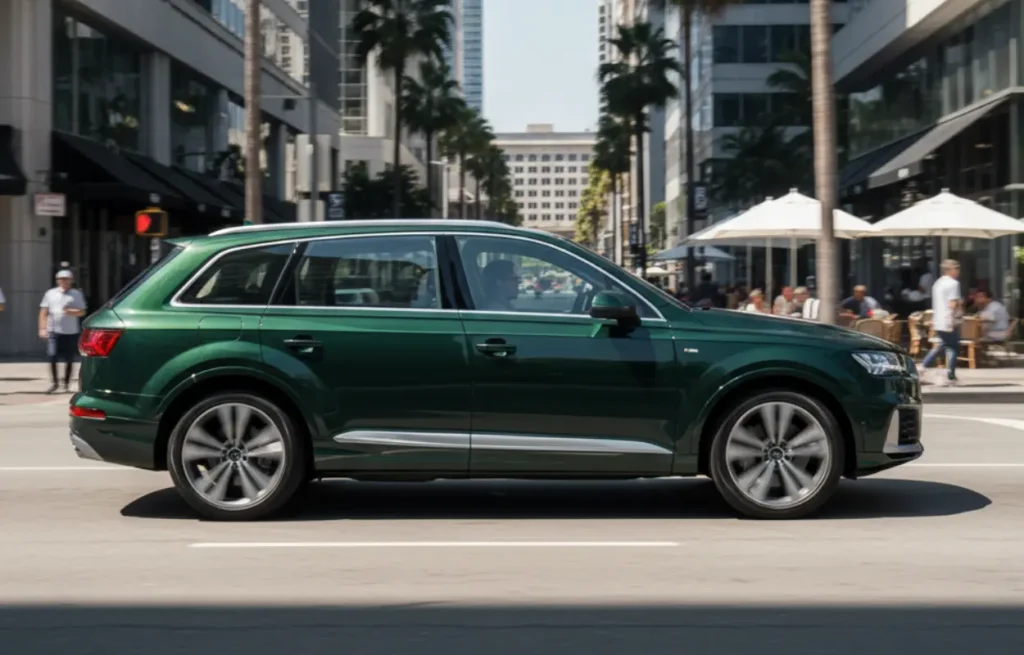
The 2025 Audi Q7 receives a significant infotainment and technology refresh, ensuring the cabin experience feels cutting-edge, connected, and intuitive. Audi builds on its already sophisticated MMI platform with faster processing, smarter software, and a more seamless digital ecosystem, elevating both driver engagement and passenger convenience.
Updated MMI Touch Response System
At the heart of the Q7’s tech suite is the dual-screen MMI Touch Response system, which now features improved performance and refined graphics:
- Upper 10.1-inch Display: Handles navigation, media, smartphone integration, and vehicle settings with sharper visuals and reduced input lag.
- Lower 8.6-inch Display: Dedicated to climate controls, seat functions, and quick-access vehicle adjustments. The use of haptic feedback gives each touch a precise, tactile response.
- The interface has been optimized for quicker menu transitions and improved gesture control, making it smoother to operate while driving.
Audi Virtual Cockpit Plus
The 12.3-inch fully digital instrument cluster remains a highlight, offering multiple configurable views:
- Classic View: Traditional gauges with modern clarity.
- Navigation View: Full-screen maps with turn-by-turn directions.
- Dynamic Performance View: Emphasizes powertrain data, ideal for spirited driving.
RS and S-line trims add sportier display themes, giving drivers more personalization options.
Enhanced Connectivity
The 2025 Q7 ensures full digital integration across devices and services:
- Wireless Apple CarPlay and Android Auto standard on all trims.
- Audi Connect Services with real-time traffic, weather, and Google-powered navigation.
- Built-in Wi-Fi hotspot for multiple devices.
- Multiple USB-C charging ports in all rows plus a wireless charging pad in the center console.
- Over-the-air (OTA) software updates allow Audi to improve navigation, infotainment, and assistance features remotely, keeping the vehicle up to date without dealer visits.
Premium Audio Systems
Two high-quality sound systems are available:
- Standard Audi Sound System: Clear and balanced audio with multiple speakers positioned strategically around the cabin.
- Optional Bang & Olufsen 3D Advanced Sound System: Delivers immersive, concert-like sound quality with up to 23 speakers and 3D acoustic processing, turning the Q7’s interior into a refined listening environment.
Smart Features and Digital Convenience
- Natural Voice Control: Enhanced “Hey Audi” voice assistant now recognizes more conversational commands, improving ease of use.
- Head-Up Display (Optional): Projects navigation, speed, and driver-assistance data directly onto the windshield.
- Digital Key Integration: Available through Audi’s app, allowing owners to unlock, start, and share access to the vehicle via smartphone.
- Ambient Interior Lighting Customization: Expanded color palette and dynamic patterns enhance the cabin’s ambiance at night.
Real-World Usability
Audi’s approach emphasizes clarity and responsiveness over gimmicks. Physical buttons remain for key functions like drive select and volume, while digital elements are clean and logically structured. The result is an infotainment system that feels advanced but easy to live with every day, a hallmark of Audi’s interior philosophy.
In short, the 2025 Audi Q7’s technology upgrades make the cabin feel more intelligent, better connected, and more enjoyable, reinforcing its position as a leader in in-car tech among luxury SUVs.
Fuel Efficiency and Real-World Economy
The 2025 Audi Q7 benefits from refined powertrains and standard mild-hybrid technology, resulting in improved efficiency without compromising the vehicle’s smooth power delivery. While it remains a sizable luxury SUV, the Q7 manages to deliver competitive fuel economy figures for its class, especially with the four-cylinder engine option, while the V6 strikes a strong balance between power and practicality.
Official Fuel Economy Estimates
Although final EPA ratings may vary slightly by trim and drivetrain, Audi’s updates to the engines and hybrid systems for 2025 are expected to deliver the following approximate figures:
- 2.0-liter Turbo Inline-Four (45 TFSI)
- City: ~20 mpg
- Highway: ~25–26 mpg
- Combined: ~22–23 mpg
- 3.0-liter Turbo V6 Mild-Hybrid (55 TFSI)
- City: ~18 mpg
- Highway: ~23–24 mpg
- Combined: ~20–21 mpg
These figures position the Q7 competitively against rivals like the BMW X5 xDrive40i and Mercedes-Benz GLE 450, particularly considering its standard quattro all-wheel-drive system and three-row layout.
Role of the 48-Volt Mild-Hybrid System
The standard 48-volt mild-hybrid system contributes significantly to the Q7’s improved efficiency:
- Start/Stop Smoothness: The hybrid system powers the starter-generator, enabling quick and smooth engine restarts at traffic lights.
- Coasting Function: At highway speeds, the engine can shut off temporarily while maintaining momentum, reducing fuel consumption during steady cruising.
- Energy Recuperation: The system recovers energy during braking and deceleration, storing it in a compact lithium-ion battery for later use during acceleration.
- Boost Assist: Briefly supplements engine power during takeoff, reducing the need for fuel-heavy throttle inputs.
These technologies work quietly in the background, improving economy while maintaining a refined driving experience.
Real-World Fuel Efficiency
In real-world driving, the four-cylinder Q7 proves impressively frugal for a luxury SUV of its size. Light throttle inputs, highway cruising, and use of Eco driving mode can often yield fuel economy above official ratings. The V6 variant offers a good balance—while it consumes more fuel, the added power and effortless performance are well-matched to the Q7’s weight and towing capabilities.
Driving Modes also influence fuel use:
- Efficiency Mode: Maximizes coasting, smooth shifts, and reduced climate control load for optimal mpg.
- Comfort Mode: Balances economy and performance for daily use.
- Dynamic Mode: Prioritizes power delivery and sharper throttle response, using more fuel but delivering sportier driving.
Practical Ownership Perspective
While the Q7 isn’t a hybrid or plug-in SUV, the 2025 model’s mild-hybrid integration and engine refinements make it more economical than previous generations. Owners can expect realistic combined fuel economy in the low- to mid-20 mpg range, depending on driving style, load, and terrain — impressive for a luxurious, all-wheel-drive, three-row SUV.
In short, the 2025 Audi Q7 demonstrates how thoughtful powertrain improvements can yield tangible efficiency gains, maintaining its luxury and performance while reducing running costs for everyday use.
Dimensions, Cargo Space, and Practicality
The 2025 Audi Q7 continues to excel in offering generous interior space, smart packaging, and everyday usability, making it one of the most versatile three-row luxury SUVs on the market. Its well-balanced dimensions contribute to a commanding road presence while remaining manageable in urban environments, and its interior layout is designed with both passengers and cargo in mind.
Exterior Dimensions
Audi has kept the overall footprint of the Q7 largely consistent, maintaining proportions that blend elegance with practicality. The Q7 measures approximately:
- Length: 199.6 in
- Width: 77.6 in (excluding mirrors)
- Height: 68.5 in
- Wheelbase: 117.9 in
This size allows for excellent interior space while ensuring the Q7 remains maneuverable in tight spaces — aided by its light steering and available rear-axle steering.
Passenger Space and Cabin Layout
The Q7’s three-row seating configuration is one of its strongest advantages. Audi has designed the cabin to maximize comfort and flexibility for all occupants:
- First Row: Offers exceptional space, supportive seats, and commanding visibility. Premium materials and ergonomic design enhance the driving experience.
- Second Row: Features sliding and reclining functionality, allowing passengers to adjust legroom or make room for third-row occupants. It’s spacious enough to comfortably seat adults, even on long trips.
- Third Row: While best suited for children or shorter journeys, it’s more accommodating than many competitors’ third rows, with easy access thanks to power-folding second-row seats.
Wide-opening doors and a low step-in height make entry and exit simple for all passengers, including those in the back.
Cargo Capacity and Versatility
The 2025 Q7 offers ample cargo space, with flexible configurations to suit a range of needs:
- Behind Third Row: Around 14.2 cubic feet — enough for groceries or small luggage.
- Behind Second Row: Expands to roughly 35.7 cubic feet when the third row is folded, making it ideal for weekend trips or bulkier items.
- Maximum Cargo Space: With both second and third rows folded, the Q7 provides up to 69.6 cubic feet of space, creating a nearly flat load floor for larger cargo.
A power tailgate with hands-free functionality is standard, while the low load floor makes loading and unloading heavy items easier.
Everyday Practicality
Audi adds thoughtful touches that make the Q7 particularly convenient for daily use:
- Multiple storage compartments throughout the cabin, including large door bins and a roomy center console.
- Split-folding second and third rows that can be operated at the touch of a button.
- Roof rails for mounting cargo boxes, bikes, or sports equipment.
- Optional air suspension that can lower the rear for easier loading.
Real-World Usability
In everyday scenarios, the Q7 excels as a family hauler, business commuter, and weekend getaway vehicle. It’s easy to park thanks to parking sensors and optional 360° cameras, while the interior remains quiet and composed on long journeys. Whether carrying passengers, luggage, or both, the Q7 adapts seamlessly to different needs.
In essence, the 2025 Audi Q7’s dimensions and practical design make it a standout among luxury SUVs — offering generous space without feeling cumbersome, and blending functionality with Audi’s signature refinement.
Common Issues and Long-Term Reliability
The 2025 Audi Q7 builds on a proven platform and benefits from Audi’s continuous refinement of its powertrains and electronics. While the Q7 has a reputation for strong mechanical durability and build quality, like any high-tech luxury SUV, it’s not entirely free from potential issues — particularly in the areas of software and long-term wear on advanced components. Understanding these areas can help owners minimize problems and maintain reliability over time.
Overall Reliability Outlook
The Q7’s engines, transmission, and quattro drivetrain are well-established and have shown solid reliability in previous model years. The 2.0-liter turbocharged engine is efficient and dependable when maintained properly, while the 3.0-liter V6 with mild-hybrid technology has proven smooth and robust. The 8-speed Tiptronic automatic transmission is praised for its durability and well-calibrated shifts. Structurally, the Q7’s chassis and suspension components are designed for longevity, especially with regular servicing.
Commonly Reported Issues in Previous Generations
While the 2025 Q7 features updated systems, some potential trouble spots from earlier versions may still be relevant:
- Infotainment System Glitches: Occasional lag or unresponsiveness in the MMI touchscreen system has been reported in previous years, usually resolved with software updates or system resets. The 2025 model’s improved processing power is expected to reduce these issues significantly.
- Electrical and Sensor Alerts: Blind spot monitoring, parking sensors, or lane assist systems may occasionally give false alerts, typically related to sensor calibration rather than component failure.
- Air Suspension Wear: On models equipped with adaptive air suspension, compressor or air spring issues can occur after extended mileage, particularly in harsh climates or without regular maintenance.
- Brake Wear: Due to the Q7’s weight and strong braking performance, brake pads and rotors may require more frequent replacement, especially on V6 models or for drivers who tow frequently.
Preventive Maintenance and Best Practices
To ensure long-term reliability, owners should follow Audi’s recommended service intervals and adopt a proactive maintenance approach:
- Keep software updated to minimize infotainment and driver assistance glitches.
- Inspect suspension components regularly, especially if equipped with air suspension.
- Follow brake service schedules, including fluid changes, to maintain performance.
- Address warning lights promptly — ignoring early signs can lead to more complex issues later.
- Use high-quality fuel and fluids, as the Q7’s engines are tuned for premium performance.
Long-Term Durability
With proper maintenance, the 2025 Audi Q7 is expected to provide excellent long-term service, both in mechanical and electronic systems. Battery components for the mild-hybrid system are designed for extended lifespans and rarely require attention. Audi’s build quality and interior materials also tend to age well, preserving the premium feel over time.
In summary, while minor electronic quirks and wear on advanced systems may occur, the 2025 Q7’s core mechanical reliability is strong. Proactive servicing and attention to software updates are the keys to ensuring a smooth ownership experience well past the warranty period.
Maintenance Schedule and Ownership Experience
Owning the 2025 Audi Q7 is designed to be a smooth and predictable experience, thanks to Audi’s structured maintenance schedule, robust powertrains, and wide service network. While this is a luxury SUV with advanced technology, routine maintenance plays a crucial role in preserving its performance, comfort, and long-term reliability.
Recommended Maintenance Intervals
Audi’s maintenance schedule for the 2025 Q7 follows a 10,000-mile or 12-month service interval, alternating between minor and more comprehensive checks:
- Every 10,000 miles / 12 months (Minor Service):
- Engine oil and filter replacement
- Brake, coolant, and windshield washer fluid checks
- Tire inspection and rotation
- Multi-point vehicle inspection
- Software updates as needed
- Every 20,000 miles / 24 months (Major Service):
- All minor service items
- Cabin air filter replacement
- Brake system inspection and fluid replacement
- Suspension and steering component checks
- Powertrain diagnostics and software calibration
- Every 40,000–60,000 miles:
- Engine air filter replacement
- Transmission fluid inspection and possible replacement
- Spark plugs (on V6 models)
- More thorough suspension and drivetrain checks, especially on air-suspension-equipped models
Mild-hybrid components typically do not require routine servicing, though the system is inspected at regular intervals to ensure optimal performance.
Maintenance Programs and Cost Management
Audi offers several ownership plans to help manage costs:
- Audi Care: Prepaid maintenance plan covering scheduled services for up to 50,000 miles, often at a lower cost than paying per visit.
- Extended Warranty Options: Available for buyers who plan to keep their Q7 beyond the standard coverage period, providing peace of mind for high-tech components.
- Certified Audi Service Centers: Recommended to ensure software updates, diagnostics, and mechanical servicing meet Audi’s standards.
Ownership Experience
In day-to-day use, the 2025 Q7 is designed to minimize owner hassle. Key conveniences include:
- Over-the-air (OTA) updates to keep software current without dealer visits.
- A comprehensive driver information system that alerts owners to upcoming service needs.
- Predictive maintenance notifications through the myAudi app, which can help schedule service appointments in advance.
Owners praise the Q7 for its refined ride, interior quality, and quiet cabin, which remain consistent even as the vehicle ages — provided regular maintenance is followed. The mild-hybrid system’s simplicity also helps keep service costs manageable compared to full hybrids or plug-in systems.
Long-Term Value
The Q7 has historically maintained strong resale value in the luxury SUV market, especially for models with complete service records. Following the recommended maintenance schedule not only ensures reliability but also helps preserve the vehicle’s resale and trade-in value over time.
In summary, the 2025 Audi Q7 offers a well-structured maintenance plan and thoughtful ownership experience, combining modern digital conveniences with proven mechanical service intervals. Owners who stay on top of routine checks can expect many years of refined, trouble-free driving.
Frequently Asked Questions (FAQ)
What engines are available in the 2025 Audi Q7?
The 2025 Q7 offers two main powertrains: a 2.0-liter turbocharged four-cylinder with 261 hp for efficient daily driving, and a 3.0-liter turbo V6 with mild-hybrid technology, producing 335 hp for stronger performance and towing. Both are paired with an 8-speed automatic and quattro all-wheel drive, ensuring smooth power delivery and excellent traction in all conditions.
Is the 2025 Audi Q7 fuel-efficient for its size?
Yes. The Q7’s 48-volt mild-hybrid system helps improve real-world efficiency by allowing engine-off coasting and smooth start/stop functionality. The four-cylinder returns around 22–23 mpg combined, while the V6 offers about 20–21 mpg combined. These figures are competitive for a three-row luxury SUV with standard AWD.
Does the 2025 Q7 have a comfortable third row?
Yes — the third row is more usable than in many competing SUVs, thanks to its power-folding second-row seats and thoughtful interior packaging. While best for children or shorter adults on long trips, it provides flexible extra seating when needed without compromising cargo space too much.
What’s new in the 2025 Q7 compared to the previous model?
The 2025 Q7 receives updated exterior styling, new HD Matrix LED headlights, revised bumpers, and new wheel designs. Inside, it gets faster infotainment processing, improved voice control, and expanded driver assistance capabilities. Powertrains are also refined for better efficiency and responsiveness.
How much can the Q7 tow?
When equipped with the V6 engine, the 2025 Audi Q7 can tow up to 7,700 pounds, making it suitable for trailers, boats, or campers. The four-cylinder can also handle light towing needs thanks to its quattro system and well-calibrated transmission.
Are there any common problems with the Audi Q7?
Serious mechanical issues are rare, but like many luxury SUVs, minor software or sensor-related alerts can occur. Infotainment glitches or parking sensor errors are typically resolved through software updates. Air suspension wear may occur over high mileage, but this is common in the segment and manageable with regular maintenance.
How often does the Q7 need maintenance?
Audi recommends service every 10,000 miles or annually, alternating between minor and major service intervals. Maintenance includes oil changes, inspections, brake fluid replacement, and software updates. Following this schedule is key to preserving performance and reliability.
Is the 2025 Q7 good for long-term ownership?
Yes. With its proven engines, mild-hybrid technology, and strong build quality, the Q7 is well-suited for long-term use. Regular servicing, timely software updates, and attention to suspension maintenance can keep it running smoothly for well over 100,000 miles.
How does the Q7 compare to competitors like the BMW X5 or Mercedes GLE?
The Q7 stands out for its refined ride quality, superior interior design, and practical third row, areas where some rivals compromise. The X5 offers sportier handling, while the GLE leans toward plush comfort. The Q7 strikes a balanced middle ground with excellent technology and everyday usability.

